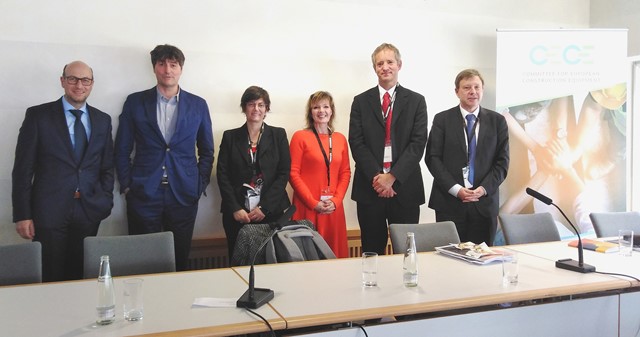Construction industry met EU officials at bauma to discuss R&D funding needs and opportunities from the EU
 From left: Ralf Lüddemann, Norbert Pralle, Fulvia Raffaelli, Sue Arundale,Arian Zwegers and Jürgen Tiedje; source: CECE
From left: Ralf Lüddemann, Norbert Pralle, Fulvia Raffaelli, Sue Arundale,Arian Zwegers and Jürgen Tiedje; source: CECE
The leitmotif of this year’s bauma was digitalisation, considered to be the current “megatrend” in the construction machinery industry.
To tackle this topic, CECE invited three representatives from the European Commission: Fulvia Raffaelli (DG GROW), Jürgen Tiedje (DG RTD) and Arian Zwegers (DG CONNECT). The point of view of contractors was represented by Ralf Lüddemann (HDB) and Norbert Pralle (ENCORD).
The event was introduced by an opening speech from CECE President Enrico Prandini, who welcomed the guests and highlighted the importance of the latest technologies, products and innovations in offering numerous opportunities for development and growth in the construction sector.
Messe München Exhibition Group Director Nicole Schmitt, representing bauma organisers, underlined the wide attendance of trade fair’s global visitors, customers, partners and exhibitors, which confirms the current positive trend of the market. From the bauma 2019 survey, which she presented, it emerged that only 4% of companies surveyed think they are leading in digital, thus digital innovation can only be reaped with proper digital skills in construction value chain.
Jürgen Tiedje opened the workshop with a presentation on opportunities under European research programmes, focusing on the potential of Horizon Europe, the research and innovation framework programme that will succeed Horizon 2020. “The construction sector is thinking about the future” he claimed, stressing the role of investments in global challenges and industrial competitiveness, which will enhance and strengthen the European research area.
Fulvia Raffaelli took the floor by presenting the support actions of the Commission to construction, mainly coordinated within the Construction 2020 Initiative. This initiative, launched in 2012, aimed at ensuring consistency and follow-up to a wider range of policies impacting the development and competitiveness of the construction value chain in Europe and globally. Mrs Raffaelli mentioned the current analysis and consultation activities, involving the EU construction stakeholders, in order to launch a new phase of this initiative, incorporating fully the digital evolution of the industry.
Arian Zwegers underlined the importance of investments in digital industrial platforms for the construction sector and pointed out that “Digital Innovation Hubs are essential in supporting companies – in particular SMEs – in their digital transformation”. He also informed participants of the successful evaluation of DigiPLACE, the first Digital Platform for Construction in Europe receiving EU funding. CECE is proud of being a partner of DigiPLACE consortium and one of the leaders of the project.
Ralf Lüddemann presented the positive aspects of automation and digitalisation in the construction business. He analysed the central requirements for the digitisation on sites from the perspective of construction companies and construction machine operators. He outlined the importance of starting with manufacturer-independent standardisation, in order to foster construction sites digitisation and attract the best workforce. “Latest technologies contribute to guaranteeing work safety”, he stressed.
Norbert Pralle offered an overview of the digital construction from the point of view of contractors. He stated that “Digitalisation is one of the solutions to improve productivity and efficiency in the construction sector”, highlighting the innovative role of tech trends in creating connected construction sites.
ECCREDI President Sue Arundale and CECE Secretary General Riccardo Viaggi concluded the workshop by presenting a proposal on a Co-programmed European Partnership on Built Environment and Construction. “The whole construction industry needs and wants to continue working on the digital transformation of the business as an enabling factor to address the main societal challenges in Europe”, asserted Sue Arundale.
Riccardo Viaggi also placed emphasis on the importance of a strategic approach towards digital construction and the key role of the European Commission towards the digitalisation of the construction industry. “CECE believes that the industry needs to work closely and strengthen relationships with the European Institutions in the future to ensure the sector's evolution” he affirmed. “Showing once again the strong collaboration between all actors of the construction industry at EU level, we are sure that our contribution today will not go unnoticed”.
The event offered a unique opportunity to discuss the challenges for research and development towards the digital transformation of the construction sector and provided a better understanding of the funding opportunities from the European Union. The attendees also had the chance to actively contribute to the debate and participate in the Q&A session with the industry experts.
Download the presentations
Arian Zwegers - Digitising European Industry
Fulvia Raffaelli - The Construction Sector-Adapting to the Digital Times
Jürgen Tiedje - Opportunities under European research programmes
Norbert Pralle - Digital Construction-View of a Contractor
Ralf Luddemann - Small steps instead of big words-Chances for digitization on sites
More news